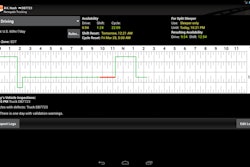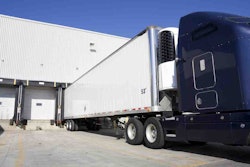 If you haven’t begun e-log implementation, you soon may be behind the 8-ball.
If you haven’t begun e-log implementation, you soon may be behind the 8-ball.Now that the driver harassment issue surrounding the Federal Motor Carrier Safety Administration’s initial electronic logging device proposed rule seems to have been ironed out and the agency has proposed a new rule, the clock for implementation will begin ticking as soon as the final rule is published, which is likely to happen later this year.
The mandate will apply to all drivers who currently are required to keep paper records of duty status. Drivers who are required to keep records of duty status in eight or more days out of every 30 days must use an ELD.
When the final rule is published, fleets will have two years to switch completely from paper logs to ELDs. At the CCJ Summer Symposium last month in San Diego, an ELD-related panel discussion of fleet executives warned the rollout of ELDs takes considerable time and management expertise to pull off correctly.
Scott Barker, vice president of safety, recruiting and driver development for Swift Transportation (No. 5, CCJ Top 250), said the ELD implementation process took a year and a half to implement once the Phoenix- based company decided to switch from paper logs in 2011. Granted, Swift is one of the largest carriers in the industry, so its implementation timeline may not mirror that of small and mid-sized fleets – but the learning curve certainly will be the same.
Neil Smith, vice president of operations, Western area, for Con-way (No. 4, CCJ Top 250), said developing a solid game plan for ELD implementation is critical for organizational success during the transition. “Drivers don’t like change,” Smith said. “Most drivers who drive over the road want to be independent. With more regulation and the notion of ‘big brother is watching,’ [electronic logging] isn’t easily received.” During its initial implementation phase, the Ann Arbor, Mich.-based company developed a pilot program to test ELDs and allowed drivers to keep both paper and electronic logs until they were familiar with the new process.
Clearly, driver resistance is one of the biggest challenges fleets that have yet to convert to ELDs will face. I received an email from a driver who was responding to a recent article on CCJDigital.com who voiced his concerns, echoing the resentment CCJ and sister publication Overdrive hear on a regular basis from drivers who want to continue with paper logs. “I will fight to the last day to not go electric,” the reader said. “When the suits in the office work 11 straight hours with a 30-minute break six days a week, then I’ll go electric.”
But as the panelists confirmed during the ELD discussion, once fleets coach their drivers and they realize the benefits of ELDs, such blowback quickly dissipates, and fleets often see a productivity increase as a result of switching to electronic logs. “Our drivers now understand the more they can run legally and safely, the bigger their W-2s will be at the end of the year,” said Barker. “We talk about what is good for the drivers and the organization, but also what it means for their families. When drivers understand we care about them as individuals, all other conversations are easy once you’ve established that relationship.”
You can read about John Christner Trucking’s (No. 117, CCJ Top 250) ELD implementation struggles here: John Christner recovers its losses from electronic logging – most of which the Sapulpa, Okla.-based company has overcome now. Jim Gomez, John Christner’s vice president of operational compliance, said the process uncovered a lot of inefficiencies within its operations and areas that it needed to improve. “[ELDs] helped us take a more detailed focus on who our drivers are and what their needs are and the importance of being more than just a company that supplies miles to drivers. It’s a quality-of-life issue.”
If your fleet still hasn’t dipped its toe into the ELD waters yet, you’re simply prolonging the inevitable. The sooner you begin the process, the more competitive and profitable you’ll be when the mandate deadline arrives. Listening and learning from your peers could be the difference between early success and long-term struggles.











